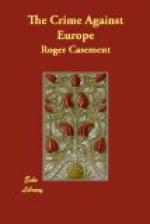If Germany is to permanently profit from a victory over England, she must free the narrow seas, not only by the defeat of British fleets in being, but by ensuring that those seas shall not again be closed by British fleets yet to be. The German gateway to a free Atlantic can only be kept open through a free Ireland. For just as the English Channel under the existing arrangement, whereby Ireland lies hidden from the rest of Europe, can be closed at will by England, so with Ireland no longer tied to the girdle of England, that channel cannot be locked. The key to the freedom of European navigation lies at Berehaven and not at Dover. With Berehaven won from English hands, England might close the Channel in truth, but Ireland could shut the Atlantic. As Richard Dox put it in 1689, quaintly but truly, in his dedication to King William III, and Queen Mary of his “History of Ireland from the Earliest Times.”
“But no cost can be too great where the prize is of such value, and whoever considers the situation, ports, plenty and other advantages of Ireland will confess that it must be retained at what rate soever; because if it should come into an enemy’s hands, England would find it impossible to flourish and perhaps difficult to subsist without it. To demonstrate this assertion it is enough to say that Ireland lies in the Line of Trade and that all the English vessels that sail to the East, West, and South must, as it were, run the gauntlet between the harbours of Brest and Baltimore; and I might add that the Irish Wool being transported would soon ruin the English Clothing Manufacture. Hence it is that all Your Majesty’s Predecessors have kept close to this fundamental maxim of retaining Ireland inseparably united to the Crown of England.”
The sole and exclusive appropriation of Ireland and of all her resources has indeed formed, since the Recorder of Kinsale wrote, the mainstay and chief support of British greatness.
The natural position of Ireland lying “in the line of trade,” was possibly its chief value, but that “Irish Wool” which was by no means to be allowed free access to world markets typifies much else that Ireland has been relentlessly forced to contribute to her neighbour’s growth and sole profit.
I read but yesterday “Few people realise that the trade of Ireland with Great Britain is equal to that of our trade with India, is 13,000,000 pounds greater than our trade with Germany, and 40,000,000 pounds greater than the whole of our trade with the United States.” How completely England has laid hands on all Irish resources is made clear from a recent publication that Mr. Chamberlain’s “Tariff Commission” issued towards the end of 1912.
This document, entitled “The Economic Position of Ireland and its relation to Tariff Reform,” constitutes, in fact, a manifesto calling for the release of Ireland from the exclusive grip of Great Britain. Thus, for instance, in the section “External Trade of Ireland,” we learn that Ireland exported in 1910, L63,400,000 worth of Irish produce. Of this Great Britain took L52,600,000 worth, while some L10,800,000 went either to foreign countries, or to British colonies, over L4,000,000 going to the United States. Of these eleven million pounds worth of Irish produce sent to distant countries, only L700,000 was shipped direct from Irish ports.




